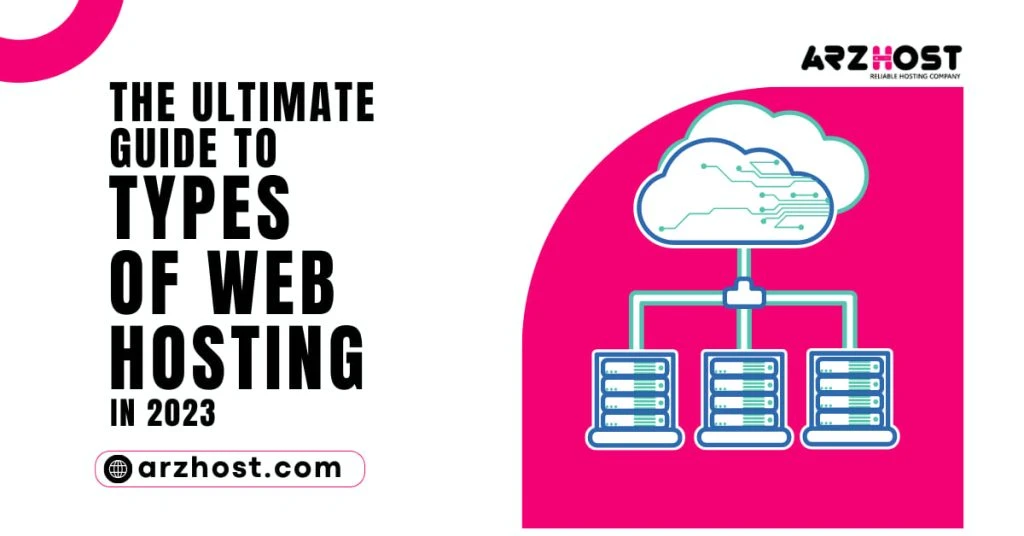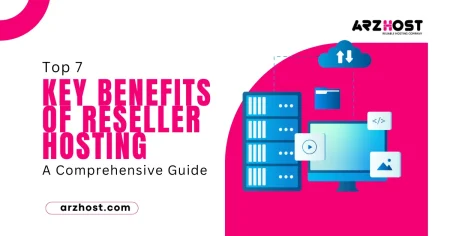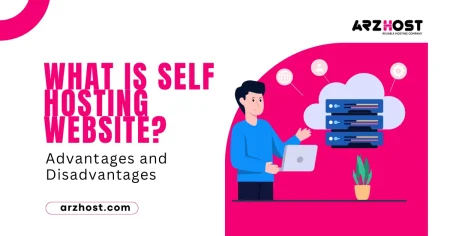Your choice about Types of Web Hosting is essential for the success of the website you intend to build. You should educate yourself on the many kinds of web hosting if you’re just starting out. You may then decide which one is ideal for your website.
Avoid rushing this procedure. Making the wrong decision when it comes to web hosting might have serious consequences for your website.
А real computer called a server houses your website and runs continually so that users can access it whenever they want. You can store all the information for your website on the servers that your supplier provides if you purchase servers for web hosting.
All the files required to load your website will be transferred by the web host’s server once a user types your domain name into their browser’s address bar.
Some of you might be searching for a new web host because you’re dissatisfied with your present one. That is the reason you are here.
Everything you need to know about Types of Web Hosting alternatives will be covered in this tutorial. Once you’ve decided on the kind of web hosting you require, you may evaluate the top companies offering this service and pick a package that suits your requirements.
What Is Website Hosting?
The technology that runs your website and makes it accessible to users worldwide is called website hosting. In other words, it provides the files to users who access your website by entering the domain name, as well as storing the files and content that make up your website.
No matter the size of the website—whether it’s a popular one like YouTube or your friend’s knitting blog—every website has some sort of web hosting powering it.
You are effectively renting space on a computer when you purchase web hosting. This could be a portion of a computer you share with others, the whole machine, or even a location on a computer network (sometimes known as “the internet”).

You can begin using your website hosting as soon as you have it. You can install software on your web hosting just like you do on your own computer (such as apps).
For instance, installing WordPress and web hosting are the two fundamental building blocks needed to create a WordPress website. After setting up these two, you may begin building your website using programs like ARZ Host.
However, if the technical aspects of managing your own web hosting leave you feeling overburdened, you can select an all-in-one managed WordPress host like ARZ Host Hosting. So that you can concentrate on designing and developing your website, it offers award-winning assistance and takes care of security, software upgrades, performance, and backups.
Regarding the resources required to power a website, various websites will have varying hosting requirements.
A website with high traffic and resource demands will require powerful hosting to meet the task, but a site with minimal traffic can get by with less.
Generally speaking, more powerful hosting will be more expensive. The same logic applies to web hosting: you wouldn’t expect a $300 budget laptop to perform as well as a $10,000 top-of-the-line computer.
How do you Identify Which Types of web Hosting is Appropriate for Your Website?
Your website’s performance, security, scalability, and management level are all impacted by the server type you choose. What is the Types of Web Hosting?
Which Types of web Hosting is Appropriate for Your Website? Your choice will also rely on the kind of website you run and how much traffic it receives.
A small personal blog with 5,000 monthly visitors, for instance, has different hosting requirements than a sizable e-commerce site with 250,000 monthly visitors. It’s also important to note that several hosting plans are available at various price points. Finding a solution that fits within your budget is therefore crucial.
There are various things to think about when selecting the ideal hosting plan for your website. Here are some essential factors to take into account so you can choose wisely:
- Website Requirements: Recognize the particular requirements of your website. Take into account elements like website traffic, projected growth, CMS needs, and any unique features or technology your website could need.
- Performance and Reliability: Select a hosting company that guarantees consistent uptime and quick page loads. Think about the server architecture, the resources at your disposal (such as CPU, RAM, and storage), and the hosting company’s track record for upholding safe and dependable environments.
- Scalability: Examine the possibility of future expansion for your website. Select a hosting plan that provides simple scalability, such as WordPress hosting or a Virtual Private Server (VPS), if you foresee a rise in traffic or resource demands.
- Budget: Establish your hosting service budget. Finding a balance between cost and the services you require is essential because hosting options come in a variety of price ranges. Dedicated servers and WordPress hosting may be more expensive, while shared hosting is typically the most affordable option.
- Support: Evaluation of the hosting company’s level of technical help. To handle any issues or worries that may emerge, look for choices that provide round-the-clock customer service through a variety of channels (such as live chat, email, or phone).
- Security: Think about the security precautions the hosting company offers, like firewalls, DDoS defense, SSL certificates, regular backups, and virus scanning. Make sure the hosting choice meets the security requirements of your website, especially if you handle sensitive user data or engage in e-commerce.
- Control and Customization: Determine how much flexibility and control over your hosting environment you need. While VPS and dedicated servers offer more flexibility and administrative access, shared hosting offers little control.
- User-Friendly Interface: Analyze the control panel or user interface of the hosting provider. Simple website maintenance activities like setting up email accounts, maintaining domains, or installing software can be made easier with a user-friendly interface.
- Reputation and Reviews: Examine the hosting company’s reputation and read client testimonials. Look for reviews that address their effectiveness, customer service, and general contentment.
- Specialized Hosting Needs: Consider specialist hosting choices designed to meet your website’s demands, such as managed WordPress hosting, e-commerce hosting, or dedicated WordPress hosting, if it has certain requirements, such as e-commerce capabilities, WordPress compatibility, or high traffic handling.
You can select the hosting solution that best fits the needs, budget, and expansion goals of your website by carefully weighing these criteria and doing extensive research.
Top 4 Types of Web Hosting
Choosing the best Types of Web Hosting solution for your website can be difficult because there are so many options available.
The majority of web hosts provide several hosting packages for various types of customers, including those who run personal blogs and business websites.
Ideally, you ought to start with the most straightforward hosting option. You can upgrade to a more complex plan after your website receives more traffic. To get a broad sense of the various hosting options and their pricing, feel free to look at ARZ Host‘s hosting prices.
Let’s look at some of the most well-known Types of Web Hosting options.
1: Shared Web Hosting
In a shared web hosting environment, a single physical server serves as the home for several websites. In this setup, the server’s resources—including processing speed, memory, and storage—are distributed among the websites it hosts.

A percentage of these resources are allotted to every website, enabling its operation and internet accessibility. Compared to other hosting options, shared web hosting is more affordable since the server’s operation expenses are split among the numerous website owners.
Website owners are relieved of the responsibility of server management by the hosting provider, who also oversees the server’s technical, security, and maintenance requirements.
Although shared hosting is inexpensive and practical, there are some restrictions to take into account. Due to the fact that resources are shared, websites with high traffic or resource requirements may affect the functionality of other websites hosted on the same server.
Additionally, compared to other hosting kinds, customization choices and server configuration management may be constrained. ARZ Host provide best ever hosting services around the globe.
Small to medium-sized websites, blogs, and personal projects that don’t need a lot of resources or complicated configurations are often ideal for shared web hosting. For people and companies beginning their internet presence, it offers a simple and affordable hosting solution.
In light of this, shared hosting is a fantastic option for newcomers that require affordable hosting to get started.
Let’s Explore Pros and Cons of shared web hosting:
Pros
Cons
2: WordPress Web Hosting
WordPress web hosting is a specific category of hosting service that is designed specifically for WordPress websites. For the creation and management of their websites, millions of people and organizations utilize the well-known content management system (CMS) WordPress.

The hosting company provides specific server settings and features for WordPress web hosting that are intended to improve the speed, security, and scalability of WordPress sites. Pre-installed WordPress software, automated upgrades, and user-friendly administrative tools made especially for WordPress users are frequently included of this sort of hosting.
Additionally, WordPress site hosting frequently comes with extra features like enhanced server caching, built-in security features, and assistance for well-liked plugins and themes. These features make websites faster, protect user data, and give both website owners and visitors a smooth experience.
By selecting WordPress web hosting, users may take advantage of a hosting environment that has been customized to match the specific needs of WordPress websites. Explore more about WordPress Hosting.
As a result, users can concentrate on producing content and expanding their online presence without having to worry about the technical details of hosting. It makes the process of setting up and administering a WordPress site simpler.
Types of Web Hosting is about best ever WordPress hosting packages typically include pre-installed themes, plugins for essential features like security and caching, and other tools.
Examine the Pros and Cons of WordPress hosting.
Pros
Cons
3: Virtual Private Server (VPS)
A virtual private server (VPS) is a kind of hosting service that gives people or companies access to a private server that is physically housed on a bigger server. It functions as a virtual computer, giving the user more freedom and control at a lower cost than a dedicated server.

With a VPS, several virtual servers—each running its own operating system and hosting environment—can coexist on a single physical server. Due to this isolation, other VPSs’ performance and stability are not impacted by the resources allotted to one.
Users often have root access or administrative capabilities, enabling them to handle their server environment according to their unique needs by installing and configuring applications, changing system settings, and managing their server environment.
Depending on their needs, they can also select the precise CPU power, memory, storage, and bandwidth. Buy VPS server from ARZ Host with unlimited bandwidth and rocking features.
People or companies who need more flexibility and control than shared hosting can provide frequently select VPS hosting since it avoids the higher expenses associated with dedicated servers. It is frequently used to host websites, run programs, control databases, or carry out development and testing tasks.
Types of Web Hosting about VPS web hosting is an excellent choice for large blogs, eCommerce stores, and medium-sized websites with a lot of visitors. Let’s explore pros and cons of vps web hosting:
Virtual Private Server Pros and Cons
Pros
Cons
4: Dedicated Web Hosting
Dedicated web hosting is a category of hosting service in which an entire physical server is solely assigned to one person or business. This configuration gives the user complete access to and control over all of the server’s resources, including its processing speed, storage capacity, memory, and bandwidth.

Dedicated hosting offers a more durable and dependable option for websites or apps with high traffic levels or particular resource requirements than shared hosting, which allows several customers to share the same server.
With dedicated web hosting, the user has the freedom to alter the configuration of the server to suit their own requirements. Without being restricted by the restrictions of a shared environment, they can install and manage any software, applications, or databases of their choice.
Due to the server’s resources being exclusively allocated to one user’s actions, this level of control and freedom enables improved performance, security, and scalability.
Additionally, since the user is separated from other users on the server, dedicated hosting offers improved security measures. Through resource sharing with unidentified or less secure programs, this isolation lowers the danger of potential vulnerabilities or security breaches.
In order to guarantee the server’s flawless operation, swiftly address any difficulties, and maintain peak performance, dedicated hosting companies frequently offer extensive technical support and monitoring services. Are you ready to grow your own website with high traffic don’t waste time?
Although dedicated web hosting has many benefits, it is essential to keep in mind that its price is often greater than that of shared hosting or other hosting solutions. This is brought on by the server’s extra management and maintenance duties and the sole utilization of hardware resources.
Large websites, e-commerce platforms, enterprise applications, and enterprises that need a high level of performance, dependability, and control over their hosting environment frequently use dedicated hosting as a result.
Types of Web Hosting about best ever option dedicated hosting is perfect for significant web enterprises that handle high traffic. Let’s examine the pros and cons of a dedicated server.
Dedicated Web Hosting Pros and Cons
Pros
- Total command over the configuration of the server
- Really dependable
- Having server root access
Cons
- Expensive and more geared toward large businesses
- It’s necessary to have technical and server management knowledge.
5: Reseller Web Hosting
Reseller web hosting is a type of hosting service where an individual or a company purchases hosting resources from a web hosting provider and then sells them to their own clients. Essentially, the reseller acts as a middleman between the hosting provider and the end users.
With reseller hosting, the reseller typically rents a dedicated server or a portion of a server from the hosting provider, and then divides the resources into smaller packages that they can sell to their clients. These packages often include features such as disk space, bandwidth, email accounts, and domain hosting.
One of the key benefits of reseller hosting is that it allows individuals or businesses to start their own web hosting company without having to invest in expensive infrastructure or technical expertise. Resellers can focus on building their brand and customer base, while the hosting provider takes care of the server maintenance and technical support.
Additionally, reseller hosting can be a lucrative business opportunity, as resellers can set their own prices and profit margins for the hosting packages they sell. This flexibility allows resellers to tailor their services to the needs of their clients and create custom hosting solutions.
Overall, reseller web hosting offers a convenient and scalable way for individuals and businesses to enter the web hosting market and generate revenue.
Here’s a breakdown of the pros and cons to help you decide if it’s right for you:
Pros
- Cost-effective: Reseller plans are typically cheaper than directly managing your own servers.
- Business Focus: Frees you to focus on marketing and customer service instead of server maintenance.
- Scalability: Allows you to easily scale your offerings based on client needs.
- Additional Features: Some resellers offer control panels with white-labelling options to build your brand.
- Brand Building: Establish yourself as a web hosting provider and build your own customer base.
- Passive Income: Potential for recurring revenue from monthly hosting fees.
- Start Small: Ideal for beginners who want to test the waters of the web hosting business.
- Flexible Pricing: Set your own prices for hosting packages and create targeted offerings.
Cons
- Limited Control: You inherit the resource limitations and control panel of the original provider.
- Support Responsibility: You become the first line of support for your customers.
- Provider Dependence: Your business relies on the uptime and performance of the original provider.
- Technical Expertise: Requires some technical knowledge to manage accounts and troubleshoot issues.
- Client Migration: Switching providers can be complex and disruptive for your clients.
- Competitive Market: The web hosting market is crowded, so differentiation is key.
- Profitability: Success requires attracting and retaining clients while managing costs.
6: Lifetime Web Hosting
A hosting service known as “lifetime web hosting” allows customers to host their website for an unlimited amount of time for a one-time charge rather than making ongoing monthly or annual payments. Because it promises cost-effectiveness and long-term stability, the concept is attractive. But it’s essential to view lifetime hosting packages warily and with suspicion.
Lifetime hosting packages are typically promoted with appealing benefits like limitless storage, bandwidth, and domains. They might also speak about their top-notch customer service and uptime promises. However, users might not be initially aware of concealed terms and limitations.
Sustainable lifetime hosting is one of the main issues. The provider of web hosting must pay continuous expenses for server upkeep, updates, and support. When a company offers hosting for a one-time fee, it begs the question of how long-term they can continue to fund these expenses.
Because of this, some lifetime hosting companies might compromise the quality of their services or stop operating altogether after a while, leaving customers stranded.
Moreover, lifetime hosting plans could have usage limits, such as resource usage caps or a lack of scalability choices. Users could also run into problems with software updates, data security, and backup dependability. Also, the service can offer slower or subpar technical support and customer help as a result of not receiving any recurring money.
In verdict, even if lifetime web hosting sounds appealing, consumers should carefully consider the reputation, terms of service, and dependability of the provider before subscribing to such a package. Choosing trustworthy hosting companies with clear costs and reliable support is usually a good idea, even if it requires paying recurring costs.
Here’s a breakdown of the pros and cons:
Pros
- Cost-effective: Lifetime web hosting plans are often cheaper than paying for monthly or annual plans in the long run.
- Long-term security: With a lifetime plan, you don’t have to worry about renewing your hosting every year, which can provide peace of mind.
- Predictable budget: You’ll know exactly how much you’re spending on web hosting for the lifetime of your website, which can be helpful for budgeting.
- May not scale well: If your website grows in popularity or complexity, a lifetime plan may not be able to accommodate your needs.
Cons
- Limited features: Some lifetime plans may have limitations on storage space, bandwidth, or the number of websites you can host.
- Potentially outdated technology: The web hosting industry is constantly evolving, and there’s a chance that a lifetime plan could lock you into outdated technology.
- Difficult to switch providers: If you’re unhappy with your lifetime web hosting provider, it can be difficult or expensive to switch to a new one.
- Read the fine print: Make sure you carefully read the terms of service of any lifetime web hosting plan before you sign up. There may be hidden fees or limitations that you’re not aware of.
7: Remote Desktop Hosting Services (RDPs)
Remote Desktop Hosting, also known as Remote Desktop Services (RDS), is a technology that enables users to access a computer or virtual desktop remotely over a network connection.
This means that instead of physically sitting in front of a particular computer, users can access its desktop, applications, and data from another location using their own device, such as a laptop, tablet, or smartphone.
The concept of Remote Desktop Hosting revolves around centralizing computing resources in a server or data center, allowing multiple users to share and access these resources remotely. This is particularly beneficial for businesses and organizations where employees need to work from different locations or need access to specific software applications that are hosted centrally.
With Remote Desktop Hosting, users can securely log in to a remote desktop session using authentication credentials. Once logged in, they can interact with the remote desktop environment as if they were physically present at the computer. This includes running software applications, accessing files, and performing tasks just like they would on a local desktop.
Remote Desktop Hosting offers several advantages, including increased flexibility, improved collaboration, centralized management of resources, and enhanced security. It allows organizations to streamline IT operations, reduce hardware and software costs, and provide a consistent computing experience across different devices and locations.
Overall, Remote Desktop Hosting is a powerful technology that enables efficient remote access to computing resources, facilitating productivity and flexibility in today’s interconnected world.
Here’s a breakdown of the pros and cons to help you decide if it’s right for you:
Pros
- Flexibility – Work from anywhere with an internet connection
- Cost-effective – Reduced hardware and IT maintenance costs
- Centralized data – Data is stored securely on the remote server
- Disaster recovery – Data is less susceptible to loss from hardware failure
- Easy setup – No complex software installation required on your device
Cons
- Reliance on internet connection – Slow or unreliable internet can disrupt work
- Security risks – Increased vulnerability to hacking if not properly secured
- Limited functionality – May not support all software or multiple monitors
- Downtime – Service outages can prevent access to your desktop
- Less control – Limited administrative access on the remote desktop
8: Self-Service Web Hosting
Self-service web hosting refers to a hosting model where individuals or businesses have the autonomy to manage their own web hosting needs without extensive assistance from the hosting provider.
In this setup, clients are granted access to tools and interfaces that enable them to set up, configure, and maintain their websites or web applications independently.
Typically, self-service web hosting platforms offer a user-friendly control panel interface where users can perform various tasks such as domain registration, managing email accounts, uploading website files, configuring databases, and monitoring website performance.
This approach empowers users to have greater control over their online presence and allows them to make changes or updates to their websites in real-time without having to rely on technical support.
Self-service web hosting is favored by individuals and small businesses who prefer a more hands-on approach to managing their websites and value the flexibility and convenience it provides. However, it may require a certain level of technical knowledge and expertise to effectively utilize the tools and features offered by the hosting provider.
Overall, self-service web hosting offers a cost-effective solution for those who are comfortable taking on the responsibility of managing their own web hosting environment.
Self-service web hosting offers a do-it-yourself approach to managing your website. It can be a good option for those who want more control and customization, but it also comes with added responsibility.
Here’s a breakdown of the pros and cons:
Pros
- Control – You have complete control over the server configuration, software installation, and security measures.
- Customization – You can install any software or applications you need that may not be available on shared hosting plans.
- Cost-Effective (Long-Term) – For high-traffic websites, self-hosting can be cheaper in the long run compared to paying monthly fees for shared hosting.
- Privacy – You have complete control over your data and who has access to it.
Cons
- Technical Knowledge Required – Managing a server requires technical knowledge of server administration, security, and software updates.
- Maintenance Burden – You are responsible for all server maintenance tasks, including backups, security updates, and troubleshooting any issues.
- Upfront Investment – Setting up a self-hosted server requires an initial investment in hardware, software licenses, and potentially colocation fees.
- Scalability Challenges – Scaling a self-hosted server to handle increased traffic can be complex and require additional resources.
Why Web Hosting is Needed for Your Website?
The number of websites on the internet is increasing as more and more companies adopt a digital strategy. A strong website may increase online traffic and profit for your company.
Not everyone who creates an online platform, meanwhile, is successful in breaking the digital code. Poor website functionality and a lousy user experience contribute to the failure of many enterprises.
The three pillars of effective web design, search engine optimization, and reliable web hosting support the usability of a website.
Buying a domain name alone won’t solve the problem. In order to make sure that people can find your website on the internet, you must either have a web hosting account or employ a web hosting firm.
How does Types of Web Hosting work?
A hosting company uploads all of its files to a server when you construct your internet site. Your website can be stored in this area on the internet thanks to the web host. On the server, you first share a networking area.
You can choose to have a separate place on the server for your portal if your needs for online storage grow. The web hosting company manages this storage area on your behalf, making sure that your website can be successfully accessed online.
Users connect to the server that hosts your website when they type your domain name into their web browser. Then, the server delivers to the user’s computer the files that are available for viewing.
5 Reason Why Web Hosting is Needed for Your Website?
The two main categories of web hosting solutions are. The first is a free service, whereas the second is a premium paid service. The user-facing free service is supported largely by adverts.
On the other hand, a premium service offers much better flexibility in terms of storage for handling high web traffic and is ultimately significantly more dependable and safe. Naturally, the provider of free hosting services will meet your needs for your personal blog or non-profit website.
Types of Web Hosting is about web hosting is essential for your website for the following reasons:
1: Secure Server Environment
If you want a secure server on which to host your website, picking a reputable web host company is essential. A network space robust enough to fend against online threats, hackers, and other cyber-attacks can only be offered by a secure web host. Your website’s data and your clients’ private information will be secure with a reputable web host company.
2: Storing Information
What kind of web hosting partner you choose depends greatly on the volume of data that must be kept on the server hosting your website? Before you sign a contract with a hosting firm, you should thoroughly determine how much online traffic, including concurrent users, your website can take.
Setting a storage cap could result in site shutdown when your webpage is heavily trafficked. Depending on your data cap and hosting requirements, a premium web host like Hosting Foundry will give you a range of options.
3: Reliable Customer Service
A competent provider of web hosting services would have excellent customer service as their trademark. A reputable web host will be available whenever you require any form of technical support or assistance. It can provide you with a variety of ways to get in touch with them if the need arises.
4: Speed
Slow landing page loading speeds on your website are one of the biggest causes of poor customer experience. A bad web host will experience frequent site crashes as a result of excessive demand on the shared server. Your clients will seek out hosting services elsewhere where there are tools and software capable of handling lags and higher traffic as a result.
5: Flexible Pricing
Once you have decided on a web host, it is essential that you select a flexible plan that can be adjusted to meet the needs of the website.
Your web host should easily accommodate the increasing server, storage, and data speed requirements if your website expands over time. Contrarily, a free plan is probably going to be packed of non-negotiable conditions that won’t be useful when you need excellent performance.
How to Choose a Web Hosting Provider?
Working with a reliable web hosting business is vital for the success of your online presence in the modern digital era. Whether you are a small business owner, blogger, or aspiring entrepreneur, the web hosting company you choose can have a big impact on the performance, security, and usability of your website. Given the wide range of options, choosing could be challenging.
This article will guide you through the key factors to consider when choosing Types of Web Hosting & best web hosting provider, ensuring that your choice is well-informed and suits your specific requirements.
1: Assess Your Requirements
Before looking for a web hosting firm, you must determine your demands. Consider factors including the website’s nature, expected visitor volume, storage needs, and any special features or apps you might require.
By identifying your wants, you may narrow the options and pick a hosting provider that supports your unique goals.
2: Reliability and Uptime Guarantee
In order to maintain an online presence, website uptime is essential. Visitors to your website will always be able to access it thanks to a reputable web host. Look for hosting companies that provide a 99.9% uptime guarantee at the very least.
By doing this, you may prevent potential income loss and a bad user experience while ensuring that your website is always up and accessible to users.
3: Speed and Performance
The speed of a website has a significant impact on both user experience and search engine rankings. Overly slow websites might discourage visitors and undermine your SEO efforts.
Pick a web host that makes use of high-speed servers and technologies like caching and content delivery networks (CDNs) to enhance website performance. A content delivery network can deliver your website’s content more rapidly and with less latency by leveraging servers that are located close to your users.
4: Scalability and Growth Potential
Website performance has a significant impact on both user experience and search engine rankings. Too-long loading times can drive away visitors and undermine your SEO efforts.
Select a web hosting provider that uses high-speed servers and technology to enhance the performance of websites, such as caching and content delivery networks (CDNs). A content delivery network can deliver the content of your website faster and with less latency by leveraging servers that are located close to visitors’ homes.
5: Security Measures
Security for websites is essential particularly in this age of universality. To protect your website and its data, a reliable web host should give security measures first importance. Look for hosting providers who offer firewalls, SSL certificates, regular backups, and malware scanning.
You may safeguard your website from security issues like unauthorized access and data leaks by following these safeguards.
6: Customer Support
Quick and effective customer help is essential in the event of technical problems or inquiries. Look for a web hosting company that provides customer care around-the-clock via phone, email, and live chat. Reviews and testimonials from previous clients might shed light on the timeliness and caliber of the hosting company’s customer service.
7: Pricing and Value for Money
Finding a web hosting service that offers reasonable prices and good value is crucial, even though price shouldn’t be the only deciding factor. To determine the overall value, compare the features, resources, and support offered by various hosting services. Before deciding, pay close attention to any additional fees, renewal costs, and return guidelines.
8: Reputation and Reviews
Check out the reputation and client testimonials of the web hosting companies you are thinking about using. Check out independent review sites and discussion forums to get opinions and information from actual customers. A company is more likely to offer a high-quality hosting service if they have a good reputation and happy customers.
9: User-Friendly Control Panel
The management of your website and hosting settings is made simpler by a user-friendly control panel. Look for hosting companies that offer user-friendly control panels, like cPanel or Plesk, which offer simple user interfaces for activities like domain management, email configuration, and file management.
10: Additional Features and Add-ons
Consider any upgrades and other services the hosting provider may provide. One-click WordPress installation, website builders, e-commerce tools, email services, and automated backups are a few examples of potential functionality. Check to see if these features satisfy your requirements and raise the quality of your hosting service.
What is the Types of web hosting? Your success in the online world depends on selecting the best web hosting provider. By considering factors like dependability, speed, scalability, security, customer service, pricing, reputation, user-friendliness, and other qualities, you can make an informed choice that meets the needs of your website.
To make sure you select a web hosting service who gives the best quality and value for your online presence, remember to conduct in-depth research and evaluate various providers before making a choice.
What Should You Think About Before Purchasing Web Hosting?
Now that we’ve covered what web hosting is and the various hosting plans, we’ll go over each feature to help you choose the best web hosting service provider and explain why ARZ Host is the best choice among other web hosts.
The success of your firm depends on selecting the right hosting plan and vendors. Both have an effect on your website’s usability, scalability, security, and speed.
What is Types of Web Hosting, and what should you consider while making a purchase? Here are some features that are frequently offered in hosting packages as well as some advice on how to choose a host.
- Website Speed
- Security
- Control Panel
- Disk Space
- Bandwidth
- Uptime and Downtime
1: Website Speed
Users expect websites to load in five seconds or less. SEO is impacted by website performance in addition to user experience. Not all web hosting can guarantee quick website loads.
Our hosting plans are one of the things that distinguishes ARZ Host because we don’t fall under any of the typical hosting categories. Instead, each website hosted on our platform may operate in an isolated software container that includes all the tools needed to run your website (Linux, PHP, MySQL), as our web hosting is based on Google Cloud and Cloudflare.
Thanks to the separate software container, each program is entirely private and not shared, not even between your websites. In addition to the security benefits, customers have seen a 50% reduction in website load times, which has led to a churn rate of under 5%.
2: Security
Website security is a serious issue. Along with disk space and bandwidth, websites also need the security services that hosting companies offer. Despite being secure, WordPress has become a target for data breaches due to its popularity.
We advise considering the common security precautions available in each hosting service if you are not tech savvy. While many cheap or free web hosting services provide some basic security measures, more sophisticated ones can be added as extras.
Each website that ARZ Host hosts comes with a free SSL certificate. Additionally, we provide two-factor authentication and IP geolocation blocking. For all new installations, we need strong passwords, and we immediately block IP addresses that make more than six unsuccessful login attempts in a minute.
ARZ Host even offer a warranty against malware security. If your website is compromised, we’ll fix it at no cost to you. Since no website can be completely protected from hackers, we also automatically create two weeks’ worth of backups.
3: Control Panel
You should also have a look at the control panel for your hosting account, even though it doesn’t directly impact website performance.
You can manage server processes with control panels. There are numerous tools available to:
- Upload and control domains, subdomains, and web pages
- Control security and privacy
- Visitors should be redirected to another website.
- Installing programs
- Making and maintaining email accounts
- Backup your data
- protect directories
The file transfer protocol (FTP), which transfers files from your computer to an online server, is also accessible through control panels.
Don’t forget to read evaluations about the usability of the company’s control panel when you compare hosting options. If your website is difficult to use or unclear, you won’t be able to explore or utilize all of its features.
4: Disk Space
Every hosting plan contains a certain amount of disk space that you can use to store your files. Before choosing a Types of Web Hosting plan, we suggest determining the storage requirements for your website. This will let you decide which plan to use more precisely.
Different websites require different amounts of storage. If your website has a lot of media assets, consider investing in a plan with more storage because those files consume a lot of space.
Choose a hosting provider that allows you to add more disk space as needed if you can’t forecast your storage demands at this time. This will help you be ready for expansion.
5: Bandwidth
A hosting solution for websites would be incomplete without bandwidth. The bandwidth allowance of a server—also known as “data transfer” or “traffic” informally—measures its ability to transport data within a given amount of time. It is measured in megabytes per second (MB/s) or gigabytes per second (GB/s).
If you want your website to load faster, bandwidth is essential since it regulates the maximum amount of data that may be sent from your site to users. You need your server, or one that shares its resources with fewer websites, if you want higher bandwidth. However, keep in mind that more bandwidth costs more because there are fewer customers to share the cost of server rental.
Types of Web Hosting plans provide a predetermined monthly bandwidth allowance. By assessing the size of your website and the number of visitors, you may choose a hosting plan that has the right amount of bandwidth.
6: Uptime and Downtime
The most effective web hosting can operate continuously, ensuring that users may access your website at all times. Types of Web Hosting is all about High-performance of web hosting plans can swiftly get the server back up and running if it does fail.
The greater the proportion of the time that your website is up and accessible to users (or “uptime”), the better. Because we are hosted on the Google Cloud Platform, ARZ Host guarantees a 99.9% uptime guarantee.
Conclusion
One of the numerous options that must be addressed is how and where to host a new website. Opening a hosting account is the first step in developing your online presence, whether it be a blog, an online store, or another type of website. Types of Web Hosting All About Web hosting services enable online access to your website.
By familiarizing yourself with the foundations of web hosting and the many types of hosting services, you may be able to discover an affordable and reliable option for your website.
When evaluating the advantages and disadvantages of various services and hosting providers, keep your needs in mind. We at ARZ Host offer a 7-day money-back guarantee, free site migration, integration with many CMSs, and hosting coupon discounts in order to make our plans even more affordable.
If you have any additional inquiries about hosting, get in touch with our customer service staff by phone or by leaving a comment below.
FAQS
What is the difference between shared hosting and VPS hosting?
In terms of control and resource allocation, shared hosting and VPS hosting are different. Shared hosting allows numerous websites to share a single server, but VPS hosting gives each website dedicated resources and a separate virtual environment. In comparison to shared hosting, VPS hosting provides higher performance and scalability.
How do I know if I need a dedicated server for my website?
A dedicated server can be the best solution for you if your website receives a lot of traffic, wants the best performance, and requires customization possibilities. Exclusive access to server resources is provided by dedicated servers, resulting in optimal performance and improved security.
Can I switch between different types of web hosting?
Yes, the majority of web hosting companies give you the choice to upgrade or reduce your hosting package. You may quickly switch between shared hosting, VPS hosting, and dedicated servers if your website’s requirements alter over time. When implementing such modifications, it’s crucial to take the migration procedure and any downtime into account.
Is WordPress hosting suitable for small websites?
The scalability and flexibility of WordPress hosting are well known, but it is not just for big websites. Because WordPress hosting offers high uptime, superior reliability, and the capacity to expand resources based on traffic variations, small websites can also profit from it.
What are the advantages of managed WordPress hosting?
Automatic updates, improved security measures, professional WordPress support, and optimum performance for WordPress websites are just a few benefits of managed WordPress hosting. It makes management easier, enabling website owners to concentrate on content creation and expansion.
How important is website speed for SEO?
Search engine optimization, often known as SEO, heavily depends on website speed. Websites that load more quickly frequently place higher in search engine results, which boosts organic traffic and improves user experience. The performance of your website’s SEO can be improved by speed optimization.










